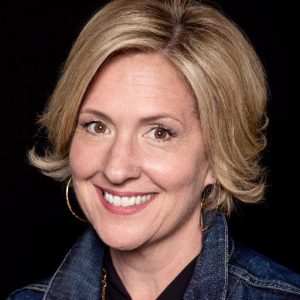Brené Brown
Courage Is Born from Struggle
“Hope is a function of struggle.” Brené Brown, a researcher and scholar, on the value and power of adversity to give rise to the astonishing strength of which we are all capable.
Guest

Brené Brown is a research professor at the University of Houston, where she holds the Huffington Foundation-Brené Brown Endowed Chair at the Graduate College of Social Work. Her books include The Gifts of Imperfection, Braving the Wilderness, and, most recently, Dare to Lead.
Transcript
KRISTA TIPPETT, HOST: Failure and vulnerability are the very elements of spiritual growth and personal wisdom. What goes wrong for us as much as what goes right — what we know to be our flaws as much as what we know to be our strengths — these make hope reasonable and lived virtue possible. They are part of our gift to the world.
Brené Brown has become a sought-out teacher in all kinds of settings, at every level of leadership, on this ancient, basic truth that had been lost from our common vocabulary for generations. It all began with research she did at the University of Houston’s Graduate College of Social Work, where she’s a professor:
BRENÉ Brown: “I always ask a very simple question to people. I just say, think of the last time you did something that you thought was really brave or the last time you saw someone do something really brave. And I can tell you as a researcher — 11,000 pieces of data — I cannot find a single example of courage, moral courage, spiritual courage, leadership courage, relational courage, I cannot find a single example of courage that was not born completely of vulnerability. We buy into some mythology about vulnerability being weakness and being gullibility and being frailty because it gives us permission not to do it.”
Ms. Tippett: Brené Brown’s own life — as a self-professed classic perfectionist — was turned inside out by these findings. She went on to share what she was learning at a TEDx talk in her Houston hometown. That has since become one of the most widely viewed TED talks of all time, despite an arguably unappealing title: “Listening to Shame.” I love learning that she stumbled on old, new truths that sound negative in modern ears while researching the nature of “wholehearted lives”…
Ms. Brown: I started coding data and looking for patterns and themes in words and they started emerging very quickly. I started to put together lists. Here are the things that wholehearted men and women really consciously choose, and here are the things that they push away from. And I just remember looking up and looking at the kind of do-not-do list. It described my entire life. I’m like, I’m on the wrong list.
Ms. Tippett: So what was on it? Well, let me just ask you this first. Did you think that you were going to find that these people had been better parented or had less trauma or better support systems?
Ms. Brown: I had a lot of self-righteousness about that. I think I thought, well, these people, you know, the people who believe in their worthiness, their lives probably panned out extremely well. They were dealt a better hand of cards. Their nail polish doesn’t chip, no stretch marks, no struggles. But that wasn’t the case. There weren’t fewer divorces or bankruptcies or history of trauma or addiction. They were just like the general population in terms of those variables. They were just like everyone else.
Ms. Tippett: So what was on the list that described you?
Ms. Brown: Perfectionism, judgment, exhaustion as a status symbol, productivity as self-worth, cool, what do people think, performing, proving, quest for certainty. Such a pretty picture.
Ms. Tippett: And was vulnerability — the way you use the word now — an underlying quality of these lives of wholeheartedness?
Ms. Brown: Yes, absolutely. These were folks who show up in their lives without a lot of guarantees. I remember sitting at that table a couple of days later kind of making the decision that I was going to put the data away and get a therapist — and I did. I remember thinking: Does this mean that our capacity for wholeheartedness can never be greater than our willingness to be brokenhearted?
Ms. Tippett: This gets back to our cultural allergy to vulnerability — what we have done with this primal sense of vulnerability. It’s not a bad impulse, our need to protect ourselves and those we love, but we’ve gone perfectionistic on it.
Ms. Brown: We have. I think the part that really pushed me to getting help and wanting to live differently was what I was seeing about parenting. Who we are and how we engage with the world is a far more accurate predictor of how our children will do than what we know about parenting. I agree with you. I think we’re in a gentle, quiet awakening period right now. But I started my research just very coincidentally six months before 9/11. Over the course of the last 12 years, I have seen fear absolutely run roughshod over our families. And I have seen us go to these crazy lengths to protect ourselves and our children from the uncertainty of the world today. I’ve not only seen that through my lens as a researcher, but certainly experienced it as a parent, and as a college professor. I see students come to us who have never had experiences, real experiences, with adversity. And how that shows up is hopelessness. One of the most interesting things I’ve found in doing this work is that the wholehearted share in common a profound sense of hopefulness. The literature on hope, very specifically C. R. Snyder’s work from the University of Kansas at Lawrence, shows that hope is a function of struggle.
Ms. Tippett: I think that’s one of the most stunning sentences that I saw in your writing.
Ms. Brown: And that hope is not an emotion. Hope is a cognitive, behavioral process that we learn when we experience adversity, when we have relationships that are trustworthy, when people have faith in our ability to get out of a jam.
Ms. Tippett: Which is different from this pattern of having faith in our children, which means telling them everything they do is wonderful and shielding them from pain as long as we can. But boy, we know this, don’t we, this desire to create a beautiful world and life and experience for these people you love?
Ms. Brown: But you know what? I think we lose sight of the beauty. The most beautiful things I look back on in my life are coming out from underneath things I didn’t know I could get out from underneath. The moments I look back in my life and think, “God, those are the moments that made me,” were moments of struggle.
Hope is brokenhearted on the way to becoming wholehearted. Hope is a function of struggle.







Reflections